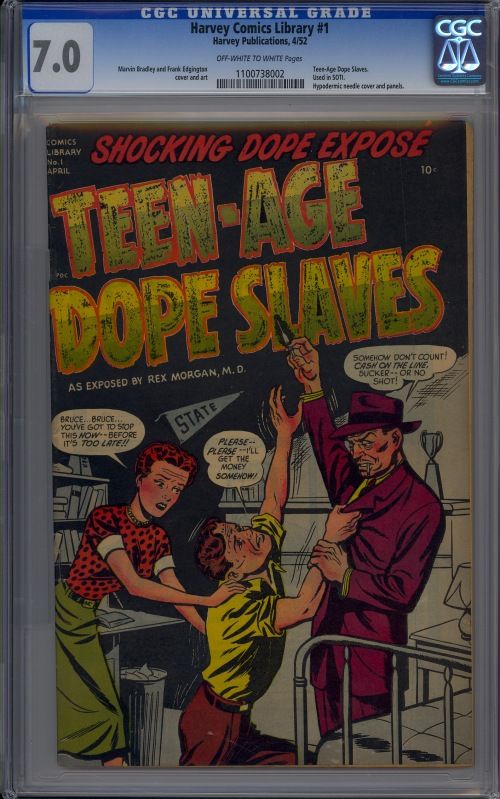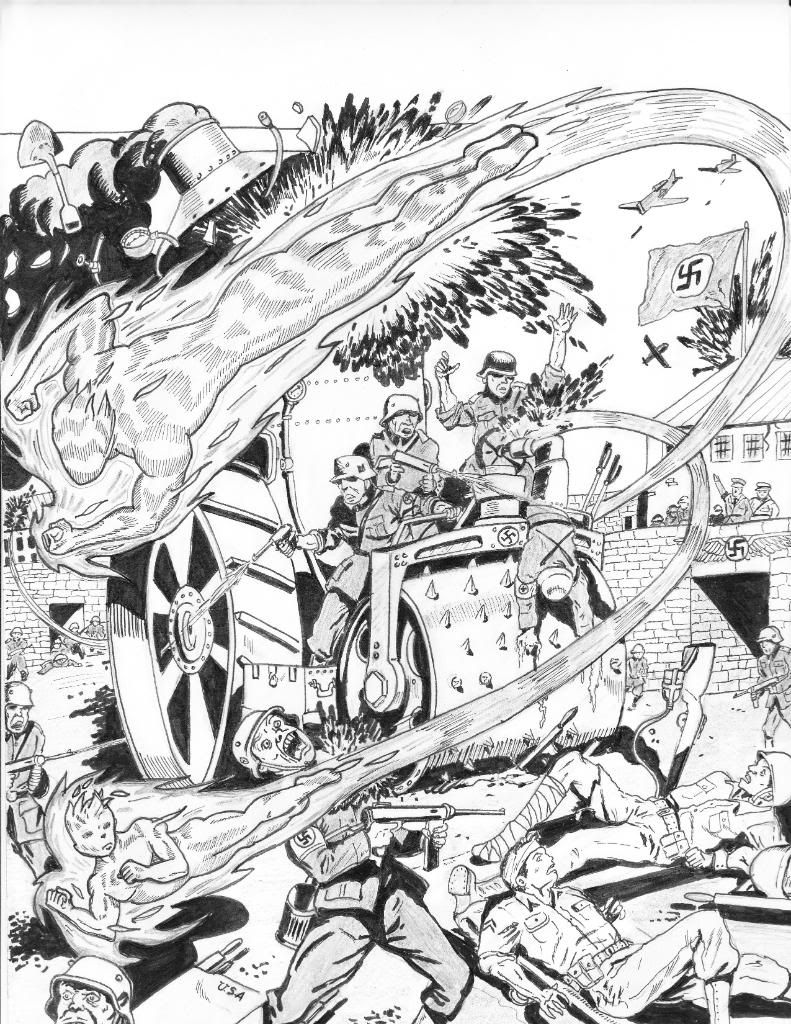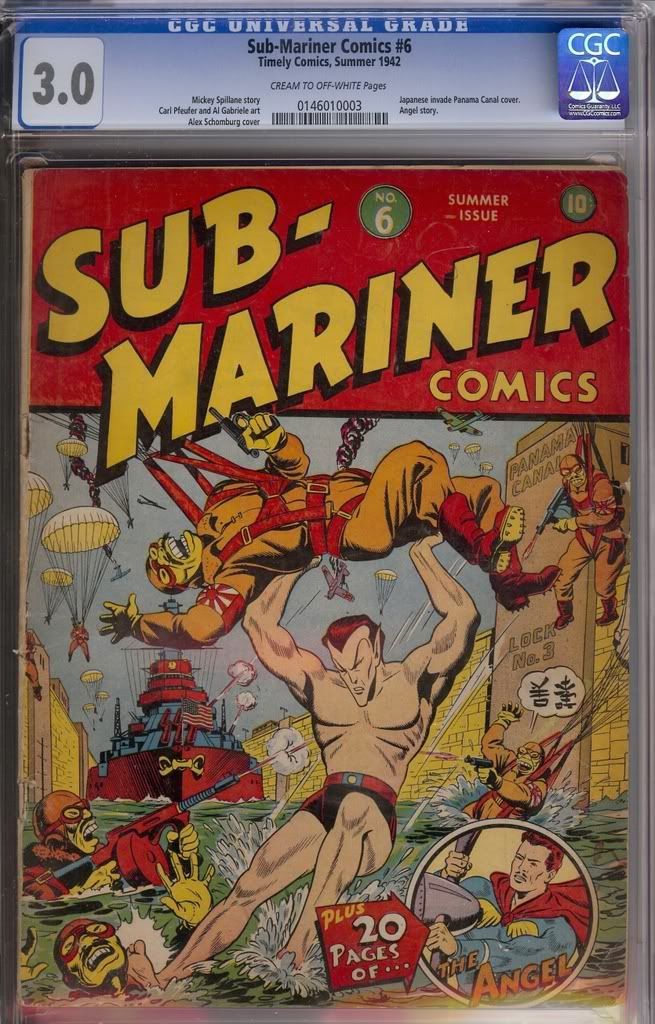-
When you click on links to various merchants on this site and make a purchase, this can result in this site earning a commission. Affiliate programs and affiliations include, but are not limited to, the eBay Partner Network.
-
Posts
3,480 -
Joined
-
Last visited
Content Type
Forums
CGC Journals
Gallery
Events
Store
Posts posted by Limited66
-
-
Got a great CSS #4 which arrived quickly and was in the exact condition described. 10 out of 10 would buy again.
-
And some others:

How rare is this Dime comics? I have a copy that I picked up because of the LB cole cover and because I had never seen one before at the time.
-
Pretty sure there was an early green hornet either movie or a serial in the 40s.
-
Been looking for a nice copy of this book for awhile!


Awesome book Rich. Congrats on finding a nice copy. Let me know when you feel like trading it

Thanks Adam! Will do. (thumbs u
Nice, never seen one of these before.
-
On the road pickup in Memphis

-
Picked up an Avengers 4 from TC33, quick turnaround, good deal. Thanks!
-
What do you think turned censors onto comics as a possible source of juvenile delinquency? Was there some increase in crime by teens or young adults in the early fifties that these studies link in a spurious correlation?
Or was it just apprehension at the general rise of a more rebellious youth culture in the fifties (rocknroll etc.)?
I need more cultural context then the documentaries I have seen on the subject. When you say "comics make children into juvenile delinquents" out loud, it doesn't pass the laugh test. It's hard to place myself into the time.
Although Sterling North wrote about the "dangers" of comic books in 1940, the push to ban or change the content of comic books really started to swell in 1948. That was the year that Dr. Wertham's anti-comics campaign gained nationwide attention. He wrote an article in Saturday Review of Literature and was widely quoted in another article in Collier's titled, "Horror in the Nursery." From 1948 until the Senate hearings in 1954, anti-comics sentiment grew. Discussions popped up among parent's groups and religious groups. Municipalities like Detroit and Los Angeles discussed banning certain comics. The New York Legislature and the U.S. Senate started investigating, and so on.
As for the cultural context, of course there's no easy answer. In my opinion, you're right on both counts: a percieved increase in crime and apprehension about teen culture both contributed to the anti-comics sentiment.
After WWII, a lot of things changed. The emergence of "teens" as a market and a social force, the growth in the number of women who worked outside the home, the increasing role mass media played in people's lives, the leisure time available to kids in economic boom years, and the perception (whether real or imagined) that violent crime was on the increase all led to a fertile climate for those social watchdogs who wanted to keep everything as it had been back in the "good old days."
There's some excellent reading out there on the subject. You might want to start with David Hajdu's The Ten-Cent Plague and Bradford W. Wright's Comic Book Nation- The Transformation of Youth Culture in America.
I'll definitely have to check out the second title. I've read excerpts of the first. Thanks for responding.
I wonder if there's any empirical information about whether there was, in fact, a rise in juvenile offenses in the late forties/early fifties. I understand that much of this was attributable to hysteria or fear of cultural change, but usually when censors go after something, they ground it in something concrete even if the connection is tenuous or outright ridiculous (think Marilyn Manson in the wake of Columbine).
-
Stopped at a Half Price Books bookstore tonight and found a great deal for once.....
Uncanny X-Men #266
New Mutants #98
New Mutants #87 (x2)
Ultimate Spider-Man #'s 1-5
Amazing Spider-Man #238
Captain America Annual #8
And the best part......
With my teacher discount......just 90 cents each!
They must have just put these out......I can't imagine anyone with even a little bit of comic book knowledge not picking them up if they saw them.....
I miss Half-Price. In Austin the HP has a collectibles section, sometimes they would have pulps. The comics section was pretty nice too, but never had deals like you got. That NM #98 is great find.
-
This is a great thread. I haven't posted on the boards in a long time, except to buy books, and seeing this makes we want to check in a little more.
What do you think turned censors onto comics as a possible source of juvenile delinquency? Was there some increase in crime by teens or young adults in the early fifties that these studies link in a spurious correlation?
Or was it just apprehension at the general rise of a more rebellious youth culture in the fifties (rocknroll etc.)?
You also see a theme around the same time in pulp fiction with paperbacks like "The Young Punks" about the threat of greaser-styled hoods.
I need more cultural context then the documentaries I have seen on the subject. When you say "comics make children into juvenile delinquents" out loud, it doesn't pass the laugh test. It's hard to place myself into the time.
-
I'm super excited to have picked up my first Gaines file copy here on the boards - Weird Fantasy #20, raw. It is gorgeous, looks fresh off the presses. Must have more!
-
Kavalier and Klay by Michael Chabon - comics related and pretty darn interesting so far.
Playback - Raymond Chandler's final Marlowe novel
-
I'm still digging the show, but the more I watch the more I realize how much the characters in the book really have a unique look.
I want to accept this much more hot, well-endowed Andrea, but I keep thinking that's just not what she looks like.
Some characters are more on than others. Glenn works. Rick doesn't, but the guy is good enough for it not to matter much.
After this last episode, it looks like there are going to be major departures from the book. That's fine, just don't cut out the Governor or the end of the first major story arch.

-
I think they went the sex route with Shane because people aren't all that impressed by the betrayal of a kiss anymore. :shrug:
-
I really like the show and do not mind that it has some difference in the storyline..but I have two things that I can not get over that kinda bother me.
1) Zombies moving fast/ running

2) Zombies are smart / problem solvers. They use rocks to break glass doors. They also climb fences.

I would like if they kept the zombies as mindless....ZOMBIES
I guess everyone has to make their zombies a little different than other people's zombies.
-
definitely some plotting changes going on, i hope they don't stray too far
-
Its long gone though..... and I'm looking for another one
Well I made the drawing with the book in hand...

The hardest part of drawing Schomburg's stuff is the explosions and melting stuff I think. That, and the man was a detail fanatic. Working on this one really made me appreciate his attention to the smallest background detail.
-
This is my first attempt at a cover recreation. I chose to try and freehand copy MM #64 Schomburg's final nazi cover in the series and man did it take forever. I know its nowhere near the original, but I'm still happy that it turned out at all.
Plus I've always liked this thread and thought I'd bring it into 2010.

-
Kudos to limited66 for the great Shock SuspenseStories!

Back atcha, pal! (thumbs u
-
Kudos to limited66 for a 9.4 Captain America 131 bronze book! (I have an original Gene Colan page with the cover scene, so I wanted a nice copy to go along with the page). Quick ship, priced right. Thanks!
My pleasure! (thumbs u
-
Got some Schomburgs, ECs, and a slew of horror up at http://boards.collectors-society.com/ubbthreads.php?ubb=showflat&Number=4167530#Post4167530
-
This thread rules

-
I just finished the Punisher: Born trade and I really enjoyed it. Thank you, Garth Ennis.
-
nice weird tales of the future there!
-
nice looking 3.0
Mickey Spillane Story? Is that an additional written feature or did Mickey Spillane write comics?



peakerjer feedback and kudos
in Kudos Forum
Posted
Bought a very nice Astonishing Tales #3, which was shipped fast and secure as soon as payment was made! Great transaction, would buy again.